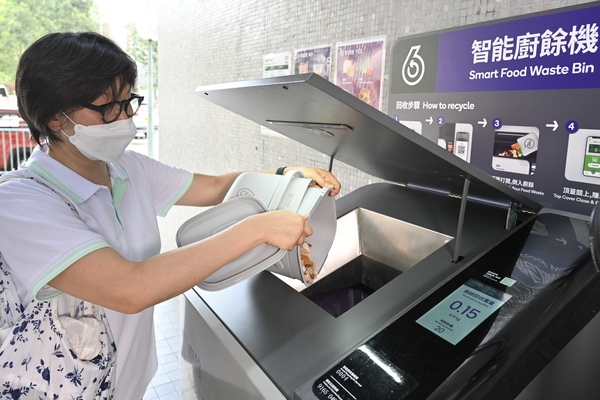Effective Food Waste Solution

To encourage residents to practise separating their food waste at home so that it can be properly collected and recycled, the Environmental Protection Department (EPD) introduced smart recycling bins that have resulted in multiple green benefits, such as reducing the amount of waste that ends up in landfills, and an opportunity for citizens to redeem points for gifts.
User-friendly
The smart recycling bins are extremely easy to use. By scanning the GREEN$ membership QR code, the lid on the bin will open automatically. After placing food waste in the bins, the lid will close automatically once the weight of the collected food waste exceeds 100g.
“Easy and simple.” That is how Environmental Protection Department Project Officer (Waste Reduction & Community Recycling) Jimmy Fung describes the operation of the smart recycling bins.
Apart from pointing out that residents can use the bins in a contactless manner, he said they can redeem gifts with GREEN$ through the gift redemption machines located at designated public housing estates or any recycling points of the EPD’s community recycling network.
Smart features
The built-in weight and fill level sensors can prevent the bins from overflowing. Plus, they are equipped with odour abatement devices that automatically spray a deodorant at regular intervals to reduce odour. The dosing frequency and amount of the deodorant spray can be adjusted according to actual needs.
The EPD is also working with the Housing Department and the Housing Society after it launched an 18-month food waste collection trial scheme at public rental housing estates starting from October last year.
The waste collected can be turned into green energy, such as producing electricity. Plus, composting it at food waste recycling facilities will reduce the burden on landfills.
Environmental Protection Department Senior Environmental Protection Officer (Waste Reduction & Community Recycling) Kenneth Tong explained that the first phase of the scheme, involving about 30 blocks in five public rental housing estates, commenced in the fourth quarter of 2022.
He added that the EPD gradually expanded its food waste collection network as the second phase of the trial scheme commenced in other housing estates in the New Territories and Kowloon since March this year.
Key expansion
“The short-term target of the trial scheme is to extend it to cover about 100 blocks of public rental housing estates in 2023-24.”
Promotional booths will be set up to brief residents about the details of the scheme as well as information on food waste recycling and the use of the smart recycling bins. Additionally, ambassadors will be on hand to help advance the strategy.
Building An Elderly-friendly Future
Step into Casa Sierra and discover a space where elderly-friendly design features are everywhere. More than just a ... Read more
Rice Cookies Revive Heritage
In the run up to the Lunar New Year, the familiar rhythmic thudding of dough echoes through the tranquil lanes of Sheu... Read more
Tai Chi Aids Control Tactics
The Hong Kong International Correctional Services Response Tactics Training Academy opened last month, with its first ... Read more
Parenting Support Heals Family Bonds
Mr Lui has been divorced for three years and is raising two children on his own. Both children have attention deficit/... Read more
Moving Waste Management Forward
Located on an artificial island near Shek Kwu Chau, the Integrated Waste Management Facilities Phase I, I·PARK1, repr... Read more
Walkway Fulfills Harbourfront Vision
Since opening late last month, the Eastern Section of the East Coast Boardwalk, at North Point, has been a popular dra... Read more

